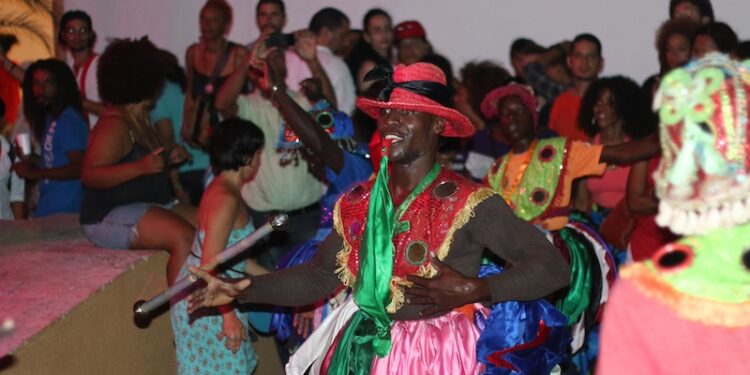Another legacy of the Trujillo dictatorship is the Concordat with the Catholic Church, recognizing Catholicism as the Dominican stateтАЩs official religion. The government subsidizes Protestant and Catholic churches, which even have offices in the National Palace. By law, the Bible must be taught in schools, and every September 27, the government celebrates тАЬBible Day.тАЭ Christian churches play a crucial role in the persistence of discriminatory tropes against Afro-Dominican heritage, as well as the legislation that crystallizes them. For example, the 2023 municipal communiqu├й announcing a ban on Gag├б in Santa Cruz de El Seibo was signed not only by the governor and the mayor but also by representatives of Evangelical churches.
Neotrujillismo and Cultural Repression
The conflict between the ideological and institutional apparatus of the Dominican regime and cultural expressions of African origin is part of a broader system of racist repression. This has been described as an apartheid regime by various authors after the denationalization of hundreds of thousands of Dominicans of Haitian descent in 2013. Even intellectuals affiliated with the current government, such as the ambassador of the Dominican Republic in Mexico, Juan Bol├нvar D├нaz, have denounced Dominican apartheid in the past.
Extensive academic literature recognizes Gag├б, Vodou, and other cultural expressions of African origin as part of the Dominican cultural heritage, dating back to the first Spanish colony that brought an enslaved population of African origin in the 15th century. Sociologist Carlos And├║jar observed that in the 1990s, more than 40 percent of homes in popular neighborhoods and rural sectors of the Dominican Republic had some altar or symbolic element related to Vodou. June Rosenberg, Dagoberto Tejeda, and Geo Ripley, among many other scholars, have written about the Dominican variant of this religion. Lusitania Martinez locates the beginning of the repression against Vodou and the music and dance of African origin to 1862 in the context of the short-lived re-annexation of the Dominican Republic by Spain. In 1992, the cult of the Cemetery Baron, the most popular manifestation of Dominican Vodou at the time, was banned. That same year, the Columbus Lighthouse, a large cross-shaped concrete building in Santo Domingo, was inaugurated by Balaguer to celebrate the 500th anniversary of the Spanish conquest, exemplifying that “Spanishization” is an unfinished process.
During the current campaign of mass deportations, cultural persecution has intensified. In April 2022, local authorities of the ruling Modern Revolutionary Party (PRM), banned the celebration of the Gag├б in the urban area of San Pedro de Macor├нs, confining it to the bateyes, marginalized communities linked to the sugar industry. San Pedro de Macor├нs, on the southeastern coast, has a long history of Haitian and English-speaking Caribbean immigration, where Gag├б and Guloyas are strong traditions. At the time, the Ministry of Culture criticized the banning of Gag├б. However, as Dominican artist Alicia M├йndez┬аpoints out, the ministry has said nothing about attempts by local authorities to ban the Gag├б in Santa Cruz del Seibo and Boca Chica in the last two years, as well as other Afro-Dominican traditions such as the Cach├║as┬аde Cabral and M├бscaras de B├бnica.
Mar├нa C├бndido, a member of the Gag├б de Los Jovillos community group in Yamas├б, about 30 miles north of the capital, says that in 2022 her group was denied a municipal permit to perform processions in other communities. In 2023, the authorities again denied them the permit, claiming that тАЬGag├б is not Dominican culture and the president does not like Gag├б.тАЭ Similar prohibitions were registered in the communities of El Seibo, San Pedro, and San Luis. In March 2024, Gag├б de Los Jovillos finally received a permit. тАЬThey were in an electoral campaign,тАЭ explains C├бndido of the friendlier treatment received by municipal authorities last year.
Two months later, Abinader was reelected. During the campaign, he compared himself to Balaguer and insisted that there is тАЬno Dominican solution to the Haitian problem.тАЭ AbinaderтАЩs regime defines Haitian immigration as an economic burden and a threat to sovereignty and national security. Massive deportationsтАФaround 500,000 between 2023 and 2024тАФhave escalated after Abinader announced a goal of 10,000 deportations per week last October.
тАЬAfrican Influence is EverywhereтАЭ
In his 1983 book La Isla al rev├йs, Balaguer affirmed that тАЬAfrican influence in our cultural manifestations has been almost imperceptible.тАЭ But the reality is quite different. Afro-Dominican heritage is evident in all popular Dominican musical genres, including merengue, bachata, and dembow, and in gastronomy and languageтАФAfrican influence is everywhere. Additionally, Gag├б is a powerful tradition that has influenced many urban, jazz, and fusion musicians in the country. Many of these musicians gathered on April 1, 2023, to support the Gag├б group from the batey La Ceja in a concert called Festigag├б in Santo DomingoтАЩs zona colonial. Notably, the concert took place despite death threats from the neo-Nazi organization Antigua Orden Dominicana, whose links to the National Police are well documented.
In the face of racist hegemony and official doctrine, a subterranean resistance in a country with an Afro-descendant majority has always existed. тАЬGag├б is restricted on television, and at the level of the elites, but in the end all of us who are from below, Dominicans or Haitians, all get involved with the music. Nobody says that because it is African music they will not dance to it,тАЭ says Mar├нa C├бndido.┬а
Even if not on television, the drums will continue to sing.
Sim├│n Rodr├нguez is an independent journalist and researcher based in the Dominican Republic.
Source link : http://www.bing.com/news/apiclick.aspx?ref=FexRss&aid=&tid=67be84df3d864fbeae1de4fff48e68c2&url=https%3A%2F%2Fnacla.org%2Fforbidden-african-legacies-dominican-republic&c=902196331068904806&mkt=en-us
Author :
Publish date : 2025-02-25 06:27:00
Copyright for syndicated content belongs to the linked Source.












